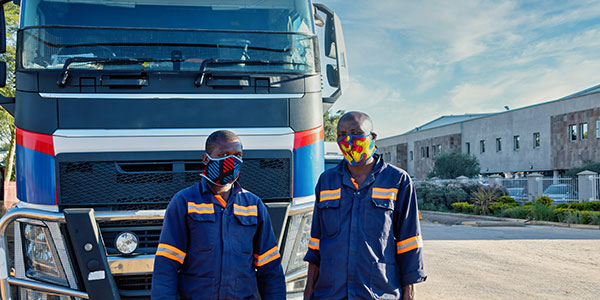Driver fatigue, rising energy costs, unmaintained roads, busy periods, and recovering from a devastated economy—there are a lot of risks that the heavy haulage industry faces every day. Here are some ways you can lower the perils your business is facing.
What Are the Risks Involved in Heavy Haulage and Trucking?
In a country with one of the highest accident rates in the world, there’s a wide range of risks that truck drivers and heavy haulage companies face.
Let’s look at six of these safety risks and perils, and then get into how you can mitigate them.
1. Rising Fuel Costs
With a two-year global pandemic and the Ukraine-Russia war, energy costs in large parts of the world have skyrocketed, and South Africa is no exception. Individuals and businesses know well that every month it’s getting harder to get by on the same fuel budget.
2. Driver Fatigue
In South Africa, people who drive for their living aren’t permitted to spend more than 90 hours per week on the road. That’s more than double what an average office employee works. It’s understandable, though – driving from one end of the country to the other takes time. However, even within these limited legal hours, drivers can easily become exhausted, which leads to human error on the road.
3. Driver Shortages
In March 2022, Business Tech reported that South Africa has a skilled driver shortage crisis, largely due to the Covid-19 pandemic and the resulting backlog in training and testing for drivers. And, considering the transport industry contributes around 20% of our GDP, it’s easy to see how this pressure can affect heavy haulage businesses.
4. Seasonal Risks
Ctrack’s Freight Transport Index indicates that in November 2021, roughly 251 trucks per hour passed through the Tugela toll plaza, the busiest long-distance freight corridor. The festive season in South Africa is an exceptionally busy time for logistics businesses, as people spend their year-end bonuses and consumer spending amps up.
5. Vehicle Roadworthiness
With poor road conditions and human error, one of the best defences against these risks is to ensure your commercial and heavy vehicles are in a roadworthy condition.
6. Inadequate Insurance
Not having enough cover for the risks that trucking businesses face is, itself, a heavy haulage risk. If any of the other perils on this list occur, your business might not survive them without commercial insurance.
How to Lower the Risks of Heavy Haulage and Trucking
1. Driver Wellness
Understanding the hardships that long-distance drivers face, the Trucking Wellness Programme launched in 1999 and offers drivers 20 roadside wellness centres or clinics on all major long-haul road travel routes in South Africa, along with free healthcare and screening tests for a range of illnesses and diseases.
Ensure your drivers stick to the 90-hour limit and encourage them to use the Trucking Wellness Programme’s services to look after their health and ensure they get the quality rest they need between long stretches on the road.
2. Energy Expenses
Unfortunately, in South Africa, there isn’t much you can do to avoid the rising energy costs. However, you can teach your drivers how to operate your heavy haulage vehicles economically. This means keeping to the speed limit and driving slower, but maintaining a steady speed, rather than constant stopping and starting. However, if there are any extended stop-go sections of road, drivers should switch off the engine while they wait their turn, as idling can burn excess amounts of diesel.
3. Driver Training
The lack of skilled drivers presents not only an economic risk but also a risk to your own drivers. It can be tempting to ask employees to put in extra hours to get the work done, but by taking part in a long-term solution to train people for skilled driving work instead, you’d be helping the economy, consumers, your staff, and your business.
4. Seasonal Planning
Our busy consumer seasons are predictable, typically happening around April and December – and in recent years, November around Black Friday and Cyber Monday.
Ensure that all trucks are in a roadworthy condition before the season begins, hire additional staff temporarily for these periods, and enlist the services of other logistics companies if necessary to manage the increased loads.
5. Keep Up with the Law
Because we have a high-accident rate in our country, the laws and regulations around road use change regularly, so make sure you stay up to date with these and educate your drivers on always abiding by the law.
6. Get Insurance
Because heavy haulage is a risky industry, business insurance is non-negotiable if you hope to keep your company going when things go wrong. If you don’t yet have it, we suggest you get in touch with financial services providers immediately to find the best cover and quotes to fit your trucking needs.
Lowering Trucking and Heavy Haulage Risks Summed Up
- Look after your drivers. Make sure they don’t exceed their hours and get quality rest between shifts.
- Teach your employees how to drive economically.
- Invest in training new drivers to help stop the driver shortage crisis we currently face.
- Plan well ahead so you can maintain your services during busy seasons without compromising safety.
- Abide by the law and ensure your drivers do the same.
- Take out comprehensive commercial vehicle insurance.
Get Insurance Quotes for Deliveries & Couriers Today




